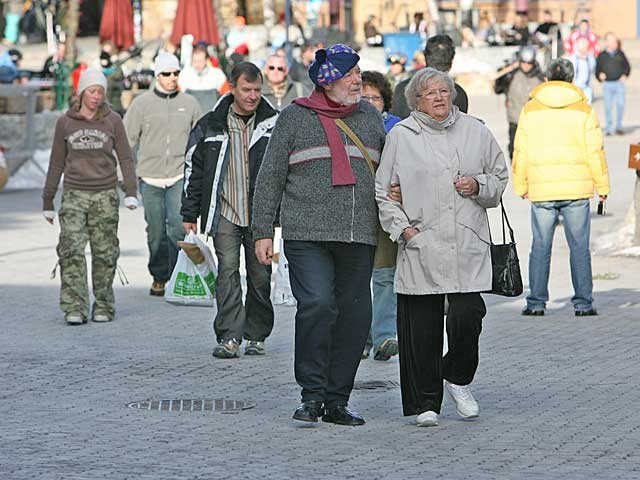Tourism Whistler has enlisted a key player in its battle against the Olympic "aversion factor," meeting with prominent tour operators last week to get the word out that the resort is wide open for business before and after the Winter Games.
At past Games, host cities have noticed a steep decline in visitor numbers in months before and after the Games themselves, mostly based on a series of popular misconceptions and bad information - namely that the resort or its amenities are closed, that the resort is under construction, that prices are higher, and that rooms are scarce.
According to Karen Goodwin, director of sales for Tourism Whistler, tour operators are very aware of the aversion factor after two years of strategy meetings and most have come to learn more specific details about Whistler and the winter of 2009-2010.
"For instance, they're keen to know what VANOC space is being blocked and when, and we got across the message that VANOC is really only here in strength for two and a half weeks in February," said Goodwin. "(Tour operators) will be able to sell regular holidays up to Feb. 10, and starting again on March 1."
They discussed ways to address misconceptions around the Games, and were given an update by John Rae of the RMOW on what Whistler would look like next season.
They also broached the topic of price. Some tour operators, who buy rooms and tickets months in advance, were disappointed that they were selling packages for this season at a higher price point than the resort, after resort partners lowered prices in the fall in response to the economic crisis.
"There was a lot of conversation about that at the workshop on Saturday," said Goodwin. "Right now it's expected that prices will be similar to the 2008-09 season. Part of the challenge (this season) is that prices had to fluctuate because of the economy, and it was not as straightforward as it would have been without the challenge of the economy. We have to look at what's the starting point, what's most aggressive in terms of pricing, and start from there."
The 2010 strategy meetings started in 2007, coordinated with the Mountain Travel Symposium and sales conference held during the World Ski and Snowboard Festival. Roughly 120 tour operators attended that first meeting.
In 2008 Tourism Whistler held a more targetted bronze medal strategy session, bringing in tour operators that bring the most traffic to the resort. This latest session was the silver medal year, and included 20 prominent tour operators and their spouses. There was one tour operator from Australia, eight from the U.K., eight from North America, a few from Canada, and one that crosses into every market.
Goodwin says that tour operators collectively represent about 30 per cent of room nights in any given year. There are about 50 operators that Whistler Tourism works with regularly, but only the biggest producers took part in the strategy session.
Goodwin acknowledged that each market has its own unique challenges and opportunities. For example, the Australian market will be targetted heavily next season because the end of December and all of January is a school holiday, and the Olympics could actually be a draw.
"The (Australian) operator has never actually sold to an Olympic destination," said Goodwin. "Torino and Park City are not big on their list, whereas Whistler is known to a large percentage of tour operators down there so (the Games) have a bigger impact. If we can get strong Aussie pricing, they say they will be okay."
Fluctuating exchange rates are definitely a challenge this far out. The Australian dollar has fallen about 15 per cent this year in relation to the Canadian dollar, while the U.K. pound has increased. As a result, Whistler.com - a reservation agency owned by the RMOW and managed by Tourism Whistler - is doing more to offer packages in different currencies.
"It's always easier to look in your own currency (when booking a holiday), even if it's just a sample price point," said Goodwin. "For example, I know Americans don't follow the exchange rate like we do. I spoke to some visitors from the U.S. recently and told them their dollar was worth about 25 per cent more than a year ago, and they had no idea. That's important to get people out shopping and into restaurants."
The tour operators are also looking at the Paralympics as an opportunity, given that tickets will likely be available to many events.
"There is a lot of the same Olympic buzz around the Paralympics, and (tour operators) can see holidays that are value-added where maybe visitors can go to a Paralympic event," said Goodwin. "It's skiers that we are trying to pull in rather than spectators, but some think it's great to have that buzz in the village and the opportunity to see a few events."
Some tour operators are already selling packages to Whistler next year, based on assumptions about prices staying relatively the same. Others will take the information they learned at the strategy session and put packages together to take to their clients.
The next step, says Goodwin, is to follow up with airlines and ensure that the resort's plans are aligned with air carriers.
"For example we had seat sales on Air Canada and British Airways out of London this year," she said. "We want to go to them and say 'here's our strategy, we're offering the best price from the get-go and you need to follow suit, go to a level and start with a seat sale.' We can layer in long stay destination business, like 10 night stays for visitors from the U.K. and Australia."
Goodwin says it's important to act quickly before media attention increases, and the aversion factor kicks in.
"We would rather educate (tour operators) on the opportunity than run scared," said Goodwin.




